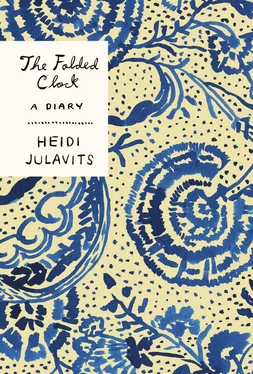I tried again. Again I failed. Everything I know about my body I learned from a book written by a home-birth midwife. I channeled her wisdom. Of particular use is her Sphincter Law, which is applicable to all muscles, even those belonging to nonpregnant people.
Sphincter muscles open more easily in an atmosphere where the woman feels safe.
The muscles are more likely to open if the woman feels positive about herself.
The muscles may close if the woman feels threatened.
But I didn’t feel threatened! And I did feel positive about myself! I was actually feeling incredibly positive about myself that I’d (a) come up with this solution and (b) dared to implement it. I tried a third time, and a fourth. I failed. I failed to pee into an airsickness bag while eight strangers slept within a two-foot radius of me.
Whenever I’ve told this story to friends, I lose the sympathies of certain reasonable people. “I would have just woken them up,” these people will say. “Fuck them, you had to pee.” I’ve defended myself as I define myself: I am a person who never wants to put another person out. I did not know these people, but I did know how terrible it is to be woken from a hard-won sleep, especially one that permits you to endure an awkward experience without experiencing it, like flying with total strangers through the night.
Today I spoke with a person about a book we’d both read. The book had been billed to him as “original” and he was complaining about how not-original this book was. I personally thought the book was original enough; besides, what does it mean to be original anymore? Hasn’t originality obsolesced? Worrying about originality is like worrying about the best place to hang your wall phone.
This person said, of the book’s unoriginality, “I mean, we all read Walden in college.”
I did not read Walden in college. I did not read Walden ever, though I recently pretended to a Spanish translator of Walden that I had read it. I have been to Walden Pond; I’ve toured Thoreau’s cabin where he wrote Walden . As a result of that visit (and after reading a few online excerpts), I’ve felt okay occasionally describing my diary as a “contemporary take on Walden .” Like Thoreau, I am pretending that I wrote this diary over the course of a year, when in fact I wrote it over the course of two years, two months, and two days (give or take). Like Thoreau, I wanted to “live deliberately” and was worried that if I did not I might, “when I came to die, discover that I had not lived.” Like Thoreau, I wanted to “live deep and suck out all the marrow of life.”
Unlike Thoreau, I have no fondness for sparse living. I do not covet hardship. I liked the idea of Walden , however, because it was written in a cabin in the woods. It’s a sort-of nature book that took place (at least the writing did) inside. Interiors are where I do my exploring. Interiors are my nature. I am an outdoorsman of the indoors. In the summer, when the teaching is done and I’m in Maine, I work in a studio that was once a chicken shack and is now scarcely better than one, that is unheated not by design but because it’s too catawumpus to support much modern infrastructure. When I am there I am happiest. In my outbuilding I am sucking out optimum marrow.
New York, however, is not so full of marrow-sucking places, not for me. I am the one being sucked empty in New York; I am harried, I grow thin, I develop face rashes. I persist in staying there for nostalgic reasons; I always dreamed of living in New York, and I am intent on realizing (and realizing and realizing, to the point of total body dissolution) this dream. At a certain point, you ask yourself, “Is this where I am going to die?” and the answer is yes . You have, without realizing it, committed your body to a plot.
But I have found one place in New York that calms me. Café Sabarsky is in the Neue Galerie, itself in an old mansion on Fifth Avenue. Café Sabarsky invokes the ’20s intellectual and artistic Austro-Hungarian wildness before all the real hell broke loose. My great-grandfather was from Austro-Hungary, anecdotally, “the Hungarian part.” His wife came from Vienna. This great-grandfather, once he relocated to America, ran the employee cafeteria at the Royal Typewriter factory in Hartford, Connecticut. He wasn’t an intellectual, but he fed people who made the typewriters on which intellectuals (maybe? a handful?) worked. He was a gourmand; he preached, via his food, the fatty, pickled gospel of the old empire. He made my father, when he was a child, for lunch, green tomato and pork sandwiches. He used an old meat grinder — I own it now — to grind dill pickles and bologna before mixing them with mayonnaise.
The connection, I realize, is super slim, but it’s enough to permit me to visit Café Sabarsky and believe that I am entitled to sit in an Adolf Loos chair beneath the Josef Hoffmann ceiling lights and eat a weisswurst mit brezen . These are my people , people. My fondness for cured meats and sauerkraut (in college, broke, I ate it with my fingers from a can), my object lust for Vienna Secessionist/Bauhaus anything, these are not superficially nostalgic graspings for the debauched and brainy scene we (as in We of Café Sabarsky) wish we’d experienced. This is my true heritage speaking through my hunger.
Only very recently — like last month — did I learn that my great-grandfather was not of Hungarian origin. A Croatian set me to rights when he asked about my name, and I told him it was Hungarian. Julavits is not a Hungarian surname, he told me. Julavits is likely Bosnian, this Croatian concluded after some research. Here, more thoroughly, is what he found.
That — its is a Hungarian way how to write the end of the south Slavic surnames
So your grand-grandfather was (or his father etc.) emigrant also in Hungary…. Maybe his identity was in some way unclear also to him. I would say that your surname probably originally was Đulabić (read : Julabich )
Đul means rose and
Đulab (Julab) is, some said, red sweet apple (Turkish-Persian word) .
I found small willage in Bosnia near Tuzla called Đulabići, from where seems the surname coming .
The Croatian also discovered this, written by the wife of my grandfather’s brother, and posted on a lineage website I had never visited:
My father-in-law came from “Vezprem” (all he ever told us) in 1905 at the age of 17. Came to Ellis Island, then Hartford, where he catered the Colt Firearm Factory restaurant. He said he left a mother, who borrowed money to send him to the States, because he was going to have to serve in the German army. His father, a jaeger (woodsman) was killed in 1894 when a tree fell on him .
Does this mean my great-grandfather didn’t work at the Royal Typewriter factory but at a gun factory? (This would explain why his old typewriter — also in my possession — is a Corona.) Does this mean he maybe was more Hungarian than not (Veszprém is in Hungary)? Does this mean he was Jewish? (“Joseph Julavits” does not appear on any of the Ellis Island ship manifests; the closest match is a person named Harry Judovitz, arrived in 1905 from Budapest, denoted as “Hungarian; Hebrew.”) Who knows. The Croatian speaks the truth: Maybe his identity was in some way unclear also to him . In the midst of such uncertainty, I cling not to what I know, but what I feel. I feel I belong in Café Sabarsky. An inexcusable nostalgia drives me there, I confess it; I have no nobler claim. I went there for lunch a few years ago when I suspected I was pregnant. I told myself, “If I am pregnant, and if it is a son, I will give him the middle name of Sabarsky.” I was not pregnant. When I did eventually have a son, I gave him the middle name Dabelstein, the maiden name of my maternal grandmother. His full name is now basically that of a law firm, but fuck it. Mine is now maybe the name of a Bosnian. I recently asked my other grandmother about her mother-in-law, my Viennese great-grandmother who made strudel and remains, despite the meddlings of the Croatian, 100 percent Viennese. What was her maiden name? Where in Vienna did she live? “Her maiden name was Korny,” my grandmother said. “Her family was so poor, they lived seven days in a ditch.”
Читать дальше












